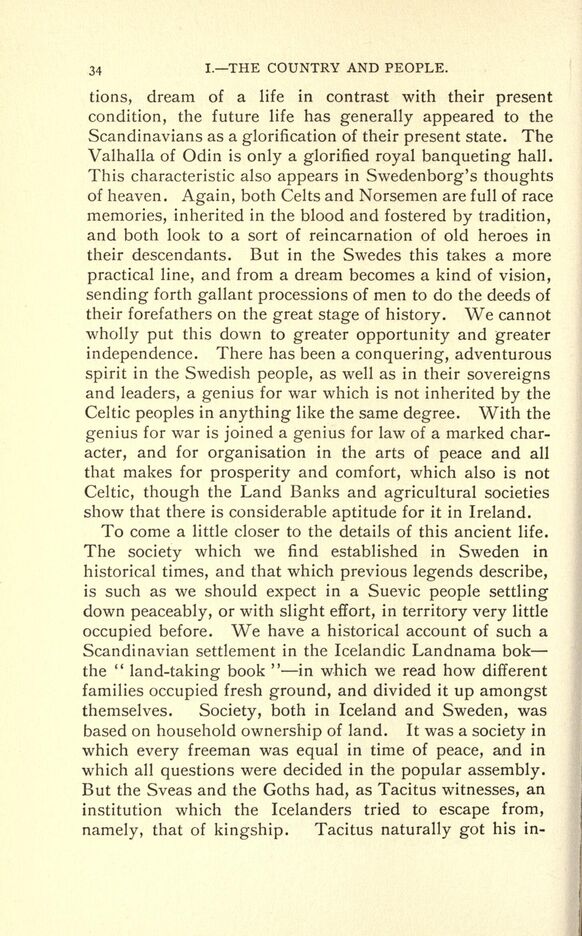
Full resolution (JPEG) - On this page / på denna sida - I. Introductory Lecture.—The Country and its Inhabitants in the Heathen Period up to 1000 A.D. - § 9. General idea of the character and life of the people

<< prev. page << föreg. sida << >> nästa sida >> next page >>
Below is the raw OCR text
from the above scanned image.
Do you see an error? Proofread the page now!
Här nedan syns maskintolkade texten från faksimilbilden ovan.
Ser du något fel? Korrekturläs sidan nu!
This page has never been proofread. / Denna sida har aldrig korrekturlästs.
34 I. THE COUNTRY AND PEOPLE.
tions, dream of a life in contrast with their present
condition, the future life has generally appeared to the
Scandinavians as a glorification of their present state. The
Valhalla of Odin is only a glorified royal banqueting hall.
This characteristic also appears in Swedenborg s thoughts
of heaven. Again, both Celts and Norsemen are full of race
memories, inherited in the blood and fostered by tradition,
and both look to a sort of reincarnation of old heroes in
their descendants. But in the Swedes this takes a more
practical line, and from a dream becomes a kind of vision,
sending forth gallant processions of men to do the deeds of
their forefathers on the great stage of history. We cannot
wholly put this down to greater opportunity and greater
independence. There has been a conquering, adventurous
spirit in the Swedish people, as well as in their sovereigns
and leaders, a genius for war which is not inherited by the
Celtic peoples in anything like the same degree. With the
genius for war is joined a genius for law of a marked char
acter, and for organisation in the arts of peace and all
that makes for prosperity and comfort, which also is not
Celtic, though the Land Banks and agricultural societies
show that there is considerable aptitude for it in Ireland.
To come a little closer to the details of this ancient life.
The society which we find established in Sweden in
historical times, and that which previous legends describe,
is such as we should expect in a Suevic people settling
down peaceably, or with slight effort, in territory very little
occupied before. We have a historical account of such a
Scandinavian settlement in the Icelandic Landnama bok
the
"
land-taking book
"
in which we read how different
families occupied fresh ground, and divided it up amongst
themselves. Society, both in Iceland and Sweden, was
based on household ownership of land. It was a society in
which every freeman was equal in time of peace, and in
which all questions were decided in the popular assembly.
But the Sveas and the Goths had, as Tacitus witnesses, an
institution which the Icelanders tried to escape from,
namely, that of kingship. Tacitus naturally got his in-
<< prev. page << föreg. sida << >> nästa sida >> next page >>